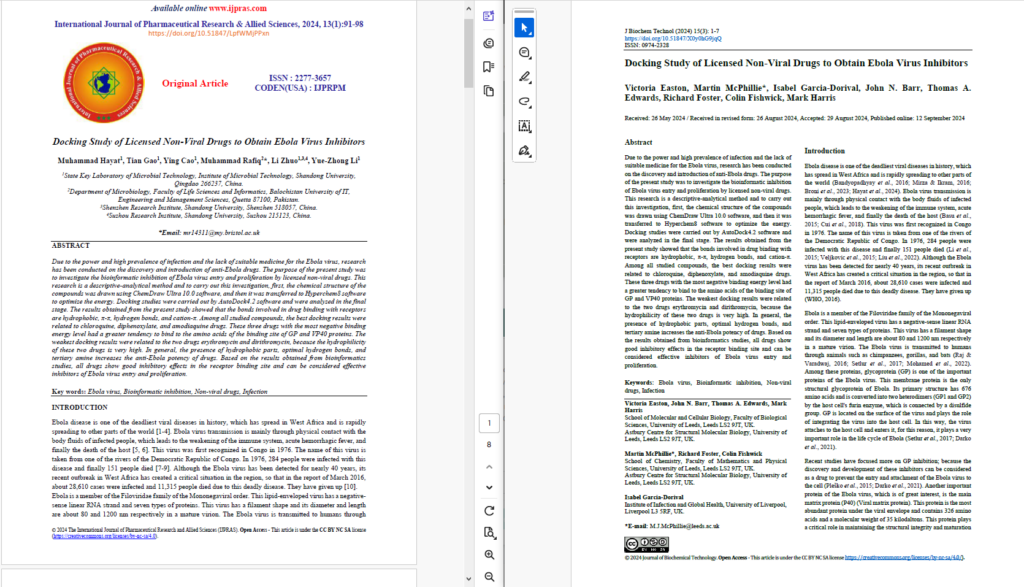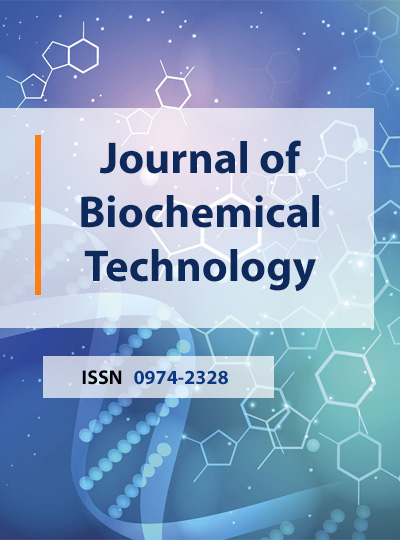Last October, Martin McPhillie, a lecturer in organic chemistry at the UK’s University of Leeds, received an email alert from his institution about a new article bearing his name.
The article, “Docking Study of Licensed Non-Viral Drugs to Obtain Ebola Virus Inhibitors,” appeared in the Journal of Biochemical Technology, a title of Istanbul, Turkey-based Deniz Publication. The journal is not indexed in Clarivate’s Web of Science database.
The study was within McPhillie’s area of expertise, and aligned with work he and the other listed coauthors had previously published. But he knew the new study wasn’t his.
“I felt very professionally violated at the time and still angry about the whole episode,” McPhillie told Retraction Watch. “I am acutely aware of how academic malpractice can ruin an academic career so did not want to be associated with this paper.”
McPhillie emailed the journal’s editor in chief, Marcello Iriti, an associate professor of biomedical, surgical, and dental sciences at the Università degli Studi di Milano in Italy, and explained the situation. Iriti “was apologetic but did not offer an explanation,” McPhillie said. According to emails seen by Retraction Watch, the editor called the publication of the article a “mystery.”
Iriti also told us he didn’t know how the paper came to be published with the names of authors who had no involvement in the work. He referred our question to an unnamed managing editor copied on his reply. The managing editor did not respond to our request for comment.
McPhillie was initially “relieved” Iriti responded, but then the journal removed the article from its website with an undated notice that stated only “This article has been retracted.”
“To my mind, ‘retracted’ usually means that the authors have committed malpractice,” McPhillie said, but in his case, “the authors are innocent” and the problem likely lies with the journal. “There is stigma associated with retracted papers.”
When McPhillie contacted Iriti again, the editor was “rather dismissive” and said “there was nothing more they could do,” McPhillie said.
“I would have thought the journal would have other options to remove papers like this,” McPhillie said, which he thinks would also benefit the journal. “They don’t seem to care.”
In cases we’ve covered previously, researchers who find their names attached to papers they didn’t write have had mixed results in getting the papers removed.
In addition to alerting the other listed authors, McPhillie Googled the paper title and found an identical article with different authors published in 2024 in the International Journal of Pharmaceutical Research and Allied Sciences. The journal appears to belong to another Istanbul-based entity, Meral Publisher, and also is not listed in Web of Science. Ozgur Karcioglu, the editor in chief, has not responded to our request for comment.

Muhammad Rafiq of the Balochistan University of IT, Engineering and Management Sciences in Quetta, Pakistan, the listed corresponding author of the International Journal of Pharmaceutical Research and Allied Sciences article, told Retraction Watch he had “nothing to do” with the paper. “I don’t know why this appeared with my name.”
Rafiq and the same group of coauthors had published a similar study, “Identification of Prospective Ebola Virus VP35 and VP40 Protein Inhibitors from Myxobacterial Natural Products,” in Biomolecules, an MDPI title, in June 2024.
Meanwhile, in December, an anonymous PubPeer user posted about the retraction statement in the Journal of Biochemical Technology and asked the authors or publisher to clarify the reason for their decision. The user also pointed out several issues in the paper, most notably the stated use of “AutoCAD,” a design software used in engineering. “I have never seen AutoCAD used in computational chemistry,” the commenter wrote.
Although the journal had removed the paper from its website, the PubPeer commenter had found a version of record on White Rose, the University of Leeds institutional repository, which has since been removed as well. McPhillie learned of the copy of the paper in the repository from PubPeer, he said.
“I have asked our research library team for information about how this paper could be deposited internally, as someone had to ‘claim’ it,” he told us. “I haven’t received a response to that, although they were sympathetic to our situation.”
Like Retraction Watch? You can make a tax-deductible contribution to support our work, follow us on X or Bluesky, like us on Facebook, follow us on LinkedIn, add us to your RSS reader, or subscribe to our daily digest. If you find a retraction that’s not in our database, you can let us know here. For comments or feedback, email us at [email protected].

This case of scientific misconduct of the mentioned journal “International Journal of Pharmaceutical Research and Allied Sciences” IJPRAS is no coincidence. I came across this in the following ResearchGate question https://www.researchgate.net/post/Is_International_Journal_of_Pharmaceutical_Research_and_Allied_Sciences_reliable_What_is_the_impact_factor_of_the_journal/2 which discussed two cases this kind of identity theft.
One is now retracted https://ijpras.com/article/examining-the-role-and-efficiency-of-personalized-medicine-in-the-diagnosis-prevention-and-treatme-gjuwj9dpshssjsq and a second one is still present:
https://ijpras.com/article/antihyperlipidemic-and-antiobesity-effects-of-parmotrema-tinctorum-ethanolic-extract-in-olive-oil-in-cbbn5ycsczdiwgk Like in the example discussed in this RW topic, the ‘Antihyperlipidemic’ paper is published in another dubious journal as well https://journals.gaftim.com/index.php/IJHMI/article/view/280 (with two of the author names used in the IJPRAS journal as well).
PS. In this case both fake papers are highly ‘inspired’ by the following original paper https://www.researchgate.net/publication/311228934_World_Journal_of_Pharmaceutical_Sciences_Antihyperlipidemic_and_antiobesity_activity_of_ethanolic_extract_of_Benincasa_hispida_fruits_on_hyperlipidemic_rats
This article is spot on. I would like to highlight that what makes this a particularly amusing example is not the identity theft itself, but rather how the article ended up being deposited in White Rose, the institutional repository of the University of Leeds. Depositions can only be made by one of the authors or support staff, and they are double-checked by the library staff. Somehow, the institutional checks and balances in place were not robust enough.
Why angry? Can they include me?
I wish I had this problem…